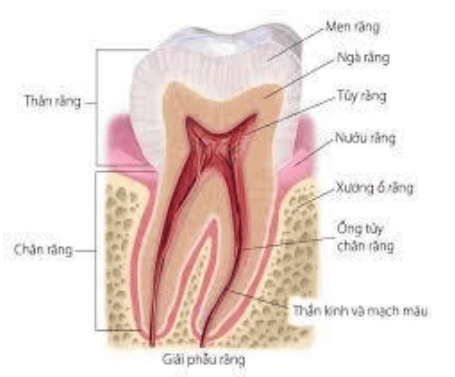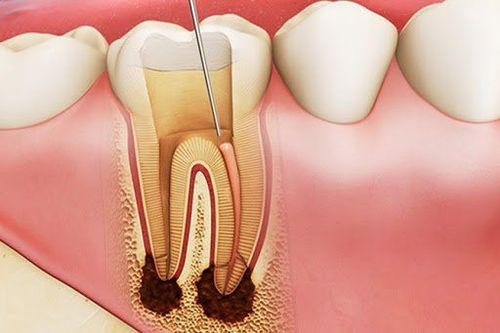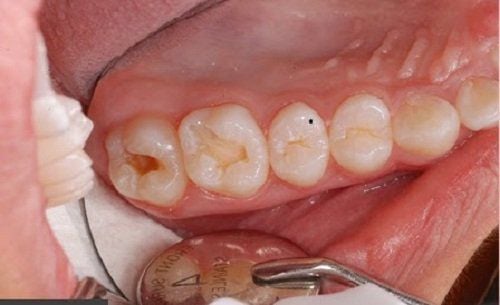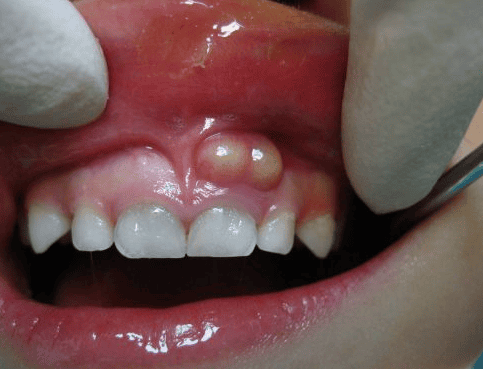This is an automatically translated article.
Article by Doctor Lai Do Quyen - Department of Interspecialty, Vinmec Times City International General Hospital.
Dental pulp diseases are common diseases and account for a high proportion of dental diseases, which greatly affect oral health as well as overall health. If the disease is not treated in time, it can lead to serious complications affecting chewing function and aesthetics.
1. What is dental pulp?
The pulp is a special connective tissue consisting of blood vessels and nerves, located in the pulp cavity and surrounded by the hard tissue of the tooth (including enamel and dentin). The pulp enters from the apex of the root.
Pulp cavity is a cavity in the middle of a tooth. The cavity in the crown of the tooth is called the pulp chamber and the pulp in it is called the pulp chamber. The cavity in the root of the tooth is called the root canal and the pulp in it is called the root pulp. Each root can have 1 or more canals, many accessory canals. The canals of a tooth are called the root canal system.
The top of the tooth root, where blood vessels and nerves enter, is called the apex (peduncle).
The pulp is involved in sensory function, nourishes and repairs dentin.

2. What is root canal treatment or root canal treatment?
Root canal treatment is the process of removing all of the tooth pulp (both chamber pulp and root pulp). After removing all the pulp tissue, the dentist will clean, shape and seal the canal system.
Years ago, teeth with pulp disease had to be extracted. Today, root canal treatment helps you keep your teeth, avoid complications later, and keep your teeth stronger.
3. Why is root canal treatment necessary?
Because the pulp is not able to heal itself, when attacked, the pulp will become weak, infected and die. If the diseased tooth pulp is not treated, the infection from the pulp will spread to the root of the tooth, causing infection of the root, the infection will spread, causing the bone around the tooth to become infected, lost, loose teeth and cause many consequences. other dangers affecting oral health and the whole body.
In addition to the cause of inflammation, the pain caused by an inflamed pulp is often severe, pain relievers do not help, make you unbearable and you must seek professional help from a dentist right away.
When a tooth has to be removed, it will leave a gap in the mouth. This gap will cause discomfort for you, affecting chewing function, aesthetics, daily activities and work. Besides, making a denture to replace lost teeth is sometimes complicated, affecting the teeth and surrounding organizations as well as hard to bring the feeling of a real tooth.

4. Which teeth need root canal treatment?
The first are teeth with pulp disease such as: caries touching the pulp, unhealthy pulp due to stimulation by fillings, teeth that are heavily ground, pulp is open due to accidents, broken teeth,...
Next are the teeth with disease in the root area such as: there is an infection in the root of the tooth, the infection creates a large pus (called Abscess) in the gums and surrounding areas causing swelling of the face, swelling of the gums, pain when chewing,
Teeth that need root canal treatment due to the requirements of dentures (bridges, crowns), cosmetic dentistry,...

5. Signs of teeth needing root canal treatment
The teeth should have root canal treatment when detecting broken teeth, severely decayed teeth to the pulp causing pain or trauma teeth causing damage to the pulp.
The most obvious sign that you need root canal treatment right away is a sharp pain in the teeth, which can be mild at the site or severe pain that spreads to the surrounding teeth and to the head, the pain can be jerky with rhythm. dam. The pain occurs spontaneously or in response to a hot, cold stimulus, or a change in pressure. Pain relievers don't help you much or have little to do with it.
Toothache is a dental emergency. In many cases, you can't stand the pain and have to seek help from your dentist right away.
The next sign is swelling of the gums in the area of the tooth decay or trauma, with or without associated facial swelling.

It is possible that the gums in the teeth are deep or traumatized with raised spots like acne, when pressed, there is fluid or yellow pus flowing out. You don't feel any toothache at all.
Swelling of the face, swelling of the gums or a pimple in the gums is a sign that the apical area has been infected by the dead pulp without prompt treatment. At this point, if there is a dental film, the dentist will show you an infected area at the tip of the tooth. The area of infection may be local or may have spread to the surrounding area.
6. Principles of root canal treatment
For the purpose of preserving teeth to ensure chewing function, taking root canals or treating root canals requires 3 principles as follows:
Aseptic: Removing all the pulp in the tooth and the root canal system must be cleaned. Root canals must be properly shaped to facilitate obturation. The canals must be sealed in 3 dimensions in space. Currently, Vinmec International General Hospital is applying the technique of root canal treatment and sealing of the root canal system with cold Gutta percha using a rotating file, root canal treatment is a technique that has existed for a long time, but treatment with a new machine file a few years ago, and Vinmec always approaches new technologies to take care of oral health in the best way for everyone.
When choosing root canal treatment at Vinmec International General Hospital, patients will be examined and treated by a team of experienced and highly specialized doctors, with the support of a system of specialized machines. Modern department, absolutely sterile.
Please dial HOTLINE for more information or register for an appointment HERE. Download MyVinmec app to make appointments faster and to manage your bookings easily.














